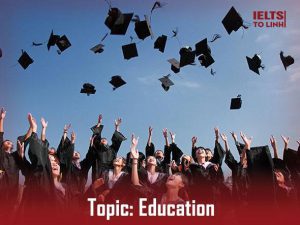Sau bài mẫu cho chủ đề Work and Career lần trước, thì lần này cô chia sẻ cho các em giới thiệu sơ lược về chủ đề Education and Schooling cho đề thi Writing task 2, cùng với bài mẫu band 9 và các từ vựng, collocation cực hay của bài viết cũng được phân tích và giới thiệu. Với chủ đề Education and schooling bao gồm các câu hỏi về phương pháp dạy học và học tập, nguồn tài liệu, tài nguyên học tập, về các bài thi và kiểm tra, quản lý trường học, động lực cho học sinh, cách cư xử, hành vi và kỷ luật trong môi trường học đường, thể thao trong trường học, hoạt động ngoại khóa, cao học, và tài trợ cho trường học.

Bài mẫu Writing chủ đề Education and Schooling
Câu hỏi
Some students work while studying. This often results in lacking time for education and constantly feeling under pressure. What do you think are the causes of this?
Bài mẫu
There is a huge range of resources available to the modern teacher, and the right selection is crucial in delivering effective lessons. I agree that there will always be a place for course books in the school curriculum, despite the many benefits of the Internet.
Firstly, course books (whether conventional or digital) have been developed by pedagogical experts and designed to be incorporated into a subject syllabus, leading to testing procedures such as formal examinations or continuous assessment. This means that they are proven to improve students’ academic achievement, enhancing their potential for progression to further or higher education. Furthermore, the use of modern course books allows pupils to coordinate their studies as part of group work, hopefully making their lessons less teacher-led and more about autonomous learning. This in itself teaches study skills such as independent research and synthesizing sources, rather than old-fashioned rote-learning. This is where the Internet, in fact, can play a useful part: to supplement and add to knowledge which the students are assimilating via their course books.
However, it is the role of teachers and school management generally to ensure that use of the Internet remains a guided learning process, and not an exercise in data-gathering from Internet sources which may be unreliable or even misleading. It is true that the Internet can be invaluable for adults (for example in distance learning or self-study modules) who are able to discriminate between sources and sift information to marshal their facts. However, this is a mature skill and we should not assume that school age pupils are ready to do this.
Overall, it appears that course books, with their quality and depth of material, are set to remain an integral part of the syllabus. The internet can be judged as a useful supplement to this if used carefully and under supervision.
(304 words)
Giải thích từ vựng
- Curriculum (n) = the full range of subjects offered by a school or group of schools (chương trình giảng dạy)
Ex: The curriculum in private schools is sometimes wider than in state schools because they have more resources.
- Pedagogical (adj) (experts) = (experts in) education and teaching (sư phạm)
Ex: The book describes current pedagogical methods used in teaching reading.
- syllabus (n) = the content of elements taught in a specific subject (giáo trình)
Ex: The instructors developed the course syllabus and designed the innovative written assignments.
- formal examinations = exams where students answer set written or spoken questions without assistance (kiểm tra, thi chính thức)
Ex: Formal examinations are the only effective way to assess a student’s performance
- continuous assessment = giving students marks for coursework or projects, rather than formal exams (kiểm tra, đánh giá liên tục)
Ex: Continuous assessment is a regular assessment of the learning performance related to a course module and that is separate from examinations, and accompanied by regular feedback.
- academic achievement = the measurable performance of a student in marks, exam results etc (thành tích trong thi cử, điểm số)
Ex: In my country, children enjoy school, but academic achievement is frankly quite low.
- further education = education after leaving school at the minimum age (đại học, cao học)
Ex: Some governments encourage further education by allowing teenagers to claim benefits while they study.
- higher education = education after age 18 at college or University, usually for a Degree (đại học, cao học)
Ex: When I pass IELTS, I plan to go on to higher education in Canada and do a degree in engineering.
- group work = study where pupils discuss and agree with a project together (bài tập nhóm)
Ex: Personally, I think that group work enables lazy children to do less work than the eager ones.
- teacher-led lessons = traditional lessons where the teacher delivers a long talk and the students take notes (kiểu học truyền thống, giáo viên giảng bài và học sinh ghi chép)
Ex: In my country, lessons are still very teacher-led and interaction is rather limited.
- autonomous learning = when a student learns through independent study and research ( tự học, tự nghiên cứu)
Ex: At University, you are expected to be an autonomous learner far more than at High School, which is quite exciting for me.
Sau bài viết trên chắc hẳn các bạn có được nhiều kiến thức về chủ đề Education rồi phải không nào? Các bài mẫu này rất hữu ích cho các bạn đang tìm phương hướng viết bài cho mình đấy. Ngoài ra các bạn có thể tham khảo thêm các bài mẫu thuộc chủ đề khác như sau:
Writing Task 2: Chủ đề Wild and Animal https://bit.ly/2Oq3fzd
Writing Task 2: Chủ đề Parental roles https://bit.ly/2LKfist
Writing Task 2: Chủ đề Salary https://bit.ly/2K3p5VW
Cô chúc các bạn học thật tốt và thành công nhé!
Trần Tố Linh.









